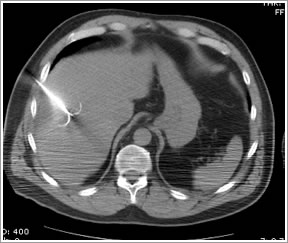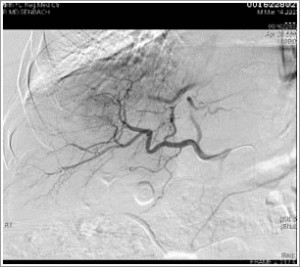Radiofrequency Ablation (RFA)
Radiofrequency Ablation (RFA) is a medical procedure in which a tumor is destroyed by utilizing high frequency electrical currents to generate heat. This heat is placed in and around the tumor, thus destroying cancer cells. Over time, the dead tumor cells are gradually replaced by scar tissue.
 RFA energy is deposited by placing a metal probe into the center of the tumor. The metal probe is guided into the tumor by using imaging guidance (CT scan and Ultrasound).
RFA energy is deposited by placing a metal probe into the center of the tumor. The metal probe is guided into the tumor by using imaging guidance (CT scan and Ultrasound).
This procedure is performed by experienced Interventional Radiologists and may be used to treat tumors in the lung, liver, kidney, abdomen, and bone.
In general, RFA is considered a viable and effective treatment option if you:
- Are not a good candidate for surgery or wish to avoid surgery
- Have a tumor less than 5 centimeters in diameter or have only a few small tumors
- Have tumors that have not responded to chemotherapy or have recurred after initial treatment (surgery or radiation)
RFA is also utilized to provide relief when a tumor invades surrounding tissue causing pain. The benefits of RFA include: no skin incision, minimal hospital stay, and minimal pain. The alternative to RFA may be surgery, radiation therapy, cryosurgery, chemotherapy, chemoembolization or no treatment at all.
Talk with your oncologist, radiation oncologist or surgeon to refer you for a consultation. You may also contact us directly at our VIP office at 352-333-7847 (7VIP).
Preparing for Radiofrequency Ablation:
PRE-OP:
- Do not eat or drink anything for 12 hours prior to your procedure.
- Make sure to let your doctor know if you have any allergies to medications or if you are on any blood thinners, including Coumadin (Warfarin), Heparin, Lovenox, Plavix or over-the-counter medications such as Aspirin, as these will need to be stopped prior to the procedure.
- Tell your physician if you are or could be pregnant.
- You will need to have your blood tested in order to determine your liver and kidney function prior to the procedure.
INTRA-OP:
- This sterile procedure uses ultrasound and CT guidance to image the tumor.
- The procedure is performed under general anesthesia by an anesthesiologist. Local anesthetic will also be applied to the site of interest.
- You will be positioned on the CT scanner and once under anesthesia a needle-like RFA probe will be placed inside the tumor.
- Radiofrequency waves will then be passed through the probe increasing the temperature within the tumor tissue resulting in destruction of the tumor.
- After RFA is complete the needle will be removed and a sterile dressing is applied.
- The procedure typically takes between 1 to 3 hours to complete.
POST-OP:
After the procedure, you will be admitted to the hospital overnight for observation and pain control.
- You may feel relaxed or sleepy as you recover from the anesthesia and your throat may be sore from the breathing tube.
- Once discharged home from the hospital you may resume your normal activities.
- You will need to return for a follow-up CT or MRI scan at one month to determine the success of the procedure.
If you develop fever or severe pain contact our office at 352-333-7847 (7VIP) or call your referring physician. After hours or on weekends, go to the nearest emergency room or call North Florida Regional Medical Center at 352-333-4000 and ask for the Interventional Radiologist on call.
Chemoembolization
Chemoembolization is a minimally invasive treatment for certain types of liver tumors. During the procedure, small plastic particles impregnated with chemotherapy are injected directly into the artery that feeds the tumor(s). This treatment results in tumor destruction by eliminating its blood supply and administering high dose chemotherapy adjacent to the cancer cells.
 The procedure is typically used to treat hepatocellular carcinoma (primary liver cancer), or metastasis (secondary liver cancer) from other types of cancers. Some liver metastases treated include: neuroendocrine including carcinoid, gastrointestinal stromal tumors, melanoma, breast and colon. Chemoembolization may be used alone or in combination with other treatments such as systemic chemotherapy, radiation therapy, and/or radiofrequency ablation.
The procedure is typically used to treat hepatocellular carcinoma (primary liver cancer), or metastasis (secondary liver cancer) from other types of cancers. Some liver metastases treated include: neuroendocrine including carcinoid, gastrointestinal stromal tumors, melanoma, breast and colon. Chemoembolization may be used alone or in combination with other treatments such as systemic chemotherapy, radiation therapy, and/or radiofrequency ablation.
Chemoembolization is generally thought of as a palliative therapy (non-curative). However, in the appropriately selected patients it can prolong survival and potentially help with adverse symptoms of cancer.
Talk with your oncologist, radiation oncologist or surgeon to refer you for a consultation. You may also contact us directly at our VIP office at 352-333-7847 (7VIP).
Preparing for Chemoembolization:
PRE-OP:
- Do not eat or drink anything for 12 hours prior to your procedure.
- Make sure to let your doctor know if you have any allergies to medications or if you are on any blood thinners, including Coumadin (Warfarin), Heparin, Lovenox, Plavix or over-the-counter medications such as Aspirin, as these will need to be stopped prior to the procedure.
- Tell your physician if you are, or could be, pregnant.
- You will need to have your blood tested in order to determine your liver and kidney function prior to the procedure.
INTRA-OP:
- This sterile procedure uses fluoroscopic (“live X-Ray”) guidance.
- The procedure itself is not painful, however light sedation medications may be administered through an IV in order to prevent any discomfort. Local anesthetic will also be applied to the skin overlying the groin.
- You will be positioned on the table and a wire and catheter will be inserted into the large artery in the leg.
- X-Ray images will be taken with contrast dye in order to visualize the artery that feeds the tumor.
- Once positioned appropriately, the chemotherapy beads will be injected into the vessel.
- After injection is complete, the wire and catheter are removed, and a sterile dressing is applied.
- The procedure typically takes between 1 to 3 hours to complete.
POST-OP:
- After the procedure, you will be admitted to the hospital overnight for observation and pain/nausea control.
- You may feel relaxed and sleepy as you recover from the sedation.
- Typically patients may feel some pain/cramping at the site of the tumor as well as mild nausea and at times a low-grade fever.
- Once discharged home from the hospital you should be able to resume your normal activities within 1 week.
- You will need to return for a follow-up CT or MRI scan at one month to determine the success of the procedure.
- Most tumors require more than one treatment with chemoembolization. The procedure may be safely repeated many times over the course of many years as long as it remains technically possible and you remain healthy enough to tolerate the procedure.
If you develop fever or severe pain contact our office at 352-333-7847 (7VIP) or call your referring physician. After hours or on weekends, go to the nearest emergency room or call North Florida Regional Medical Center at 352-333-4000 and ask for the Interventional Radiologist on call.
Selective Internal Radiation Therapy (SIRT)/Yttrium-90
Selective Internal Radiation Therapy or SIRT is a form of treatment for patients with either primary or metastatic liver tumors. Delivery of the radioactive microspheres (the radioisotope Yttrium-90 or Y-90) is through a small catheter that is advanced into the blood vessels feeding the tumors. These particles are slightly larger than normal red blood cells and when injected into the blood vessels supplying the tumor they will lodge there and deliver the radiation dose directly to the tumor without subjecting the rest of the liver or the body to the radiation.
Currently, this is considered a “palliative” and not a “curative” therapy, however, it has been shown to be effective with extending and improving patient’s quality of life. There is ongoing research to determine its role as a “first-line” treatment option in certain patients.
The procedure is similar to an angiogram and is performed on an outpatient basis with rare need for overnight admission to the hospital. There are minimal side effects, with the most common being fatigue for about one week following treatment.
Talk with your oncologist, radiation oncologist or surgeon to refer you for a consultation. You may also contact us directly at our VIP office at 352-333-7847 (7VIP).
Preparing for SIRT/Yttrium-90
PRE-OP:
- Do not eat or drink anything for 12 hours prior to your procedure.
- Make sure to let your doctor know if you have any allergies to medications or if you are on any blood thinners, including Coumadin (Warfarin), Heparin, Lovenox, Plavix or over-the-counter medications such as Aspirin, as these will need to be stopped prior to the procedure.
- Tell your physician if you are, or could be, pregnant.
- You will need to have your blood tested in order to determine your liver and kidney function prior to the procedure.
INTRA-OP:
- This sterile procedure uses fluoroscopic (“live X-Ray”) guidance.
- The procedure itself is not painful, however light sedation medications may be administered through an IV in order to prevent any discomfort. Local anesthetic will also be applied to the skin overlying the groin.
- You will be positioned on the table and a wire and catheter will be inserted into the large artery in the leg.
- X-Ray images will be taken with contrast dye in order to visualize the artery that feeds the tumor.
- Once the catheter is positioned appropriately the Y-90 particles will be painlessly injected into the vessel.
- After injection is complete the wire and catheter are removed, and a sterile dressing is applied.
- The procedure typically takes between 1 to 3 hours to complete.
POST-OP:
- The SIRT/Y-90 treatment procedure is almost always an outpatient procedure. You will be monitored in the recovery area for a few hours to make sure you are feeling well prior to discharge.
- Typically patients may feel some pain/cramping at the site of the tumor as well as mild nausea and at times a low-grade fever.
- Once discharged home from the hospital you should be able to resume your normal activities within 1 week.
- Typically Y-90 therapy is delivered in two separate sessions and can be repeated as long as it remains technically possible and you remain healthy enough to tolerate the procedure.
If you develop fever or severe pain contact our office at 352-333-7847 (7VIP) or call your referring physician. After hours or on weekends, go to the nearest emergency room or call North Florida Regional Medical Center at 352-333-4000 and ask for the Interventional Radiologist on call.

